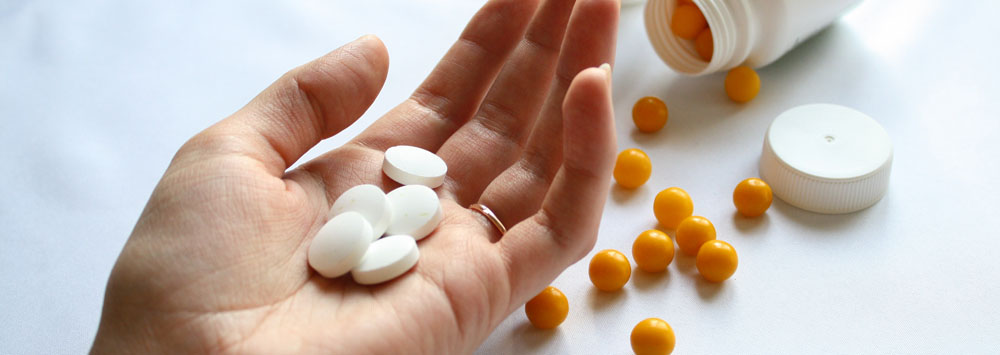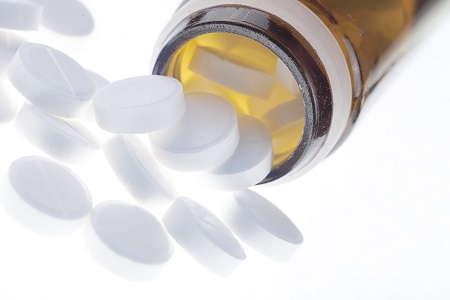Librium Withdrawal and Detox
Librium Info
Librium is a brand of Chlordiazepoxide, a benzodiazepine used in the treatment of anxiety, alcohol withdrawal and anxiety that occurs before surgery. It is quite common for drugs used to treat other addictions to become addictive themselves, especially when they are taken over a prolonged period of time.
Regular use of Librium can result in dependence, where your system becomes desensitised to its effects and you feel the need to take higher and more frequent doses to achieve the same results. This pattern of abuse can lead to physical dependence, with your brain and body adapting to the constant presence of Librium, becoming unable to function without it.

Librium is a habit-forming drug, and regular use can disrupt your brain chemistry. Withdrawal is a common problem you might experience when you’ve continuously used Librium for more than four months. This means you may encounter withdrawal symptoms if you quit abruptly or significantly reduce your dose. Such withdrawal symptoms occur because your body is trying to compensate for the absence of the substance on which it has become dependent.
Detox in this case refers to the period of time it takes your body to rid itself of Librium. Medical detox is usually the safest method for withdrawal, because benzodiazepine withdrawal can be quite severe in some cases.
Call our admissions line 24 hours a day to get help.
What is Librium withdrawal?
As a highly addictive benzodiazepine, Librium can cause dependence after only a few weeks of heavy or chronic usage. Like other drugs in this category, Librium boosts the effects of neurotransmitters in the brain that make you feel calm after taking it. After a while, your brain becomes dependent on Librium to provide the same feelings.
If you suddenly quit taking Librium, your brain will still naturally produce calming neurotransmitters, but you’ll be unable to feel their effects as significantly. You may start to feel anxious, your heart rate and blood pressure will be elevated and you’ll experience several other symptoms of withdrawal.
You could continue to experience withdrawal until your brain becomes re-accustomed to functioning without any Librium in your body. A medical detox programme can ease the withdrawal process, increasing your safety and comfort. You may also continue to have psychological Librium withdrawal symptoms for a while after the initial physical effects have faded. This type of dependence is generally more difficult to overcome. It can take months or even years to break free of the hold Librium has over you mentally.
An addiction treatment programme – in addition to ongoing therapy – can give you the best chance of a successful recovery from this psychological dependence.
Causes of Librium withdrawal

Librium withdrawal refers to symptoms that appear after an abrupt cessation or reduction in the intake of the substance. In order for withdrawal to occur, you must have first developed a form of drug dependence, which may be either physical, psychological or both.
Generally, dependence occurs in a dose-dependent manner, causing withdrawal symptoms that are determined by the type of drug you’ve consumed.
This means that if you’re engaging in prolonged abuse of Librium, your reactions when quitting would be different than somebody quitting heroin. In addition, the method of administration (whether oral, intravenous, intramuscular or otherwise) also serves to determine the severity of your withdrawal symptoms.
When withdrawal occurs, you might begin by feeling unwell, which is also known as having a ‘crash’ or ‘come down’. You’ll then likely feel worse and hit a plateau before your symptoms begin to taper off.
‘Cold turkey’ is a term used to describe suddenly quitting drug usage and its associated manifestations. Withdrawal from a benzodiazepine like Librium can be dangerous, even fatal without proper assistance. These symptoms may be even more severe when the drug has been used to mask chronic pain, prolonged malnutrition, infections and disease. When you stop using Librium, these conditions may resurface, and in some cases can be mistaken for withdrawal symptoms.
The Phases of Librium withdrawal
Understanding the phases of Librium withdrawal can help you measure the success of your detox programme, in addition to making it easier for you to find comfort when passing through the most difficult phases of withdrawal.
The initial symptoms of withdrawal (such as restlessness, disturbed sleep, stress and tremors) may begin as early as 24 hours after your last dose of Librium. However, in other cases, it can take as long as a week before you start to notice the appearance of withdrawal symptoms.
About two to three weeks after the first phase of the withdrawal period, symptoms reach their peak. During this period, they may be even more severe in nature and you may require medical help. Some of these symptoms may include seizures, psychosis, depression and loss of sleep.
The next phase of withdrawal usually begins in the fourth week after your last dose and can last as long as the sixth week. This period is known as the lag phase, during which most of your symptoms will have already started to taper away.
Even after months of drug-free living, you may experience cravings and other persistent withdrawal symptoms. However, during this phase, symptoms are less severe and tend to fade away in time.
Call our admissions line 24 hours a day to get help.
Librium withdrawal symptoms: What to expect
Librium withdrawal can be intense and uncomfortable. Usually, the longer and more severe your addiction, the lengthier and more intense you can expect the withdrawal process to be. Symptoms of Librium withdrawal are usually moderate, but can be severe in certain cases. Librium is a long-acting benzodiazepine, so withdrawal symptoms may take about four to seven days to peak, and can last for one to two weeks.
If you’ve taken the substance for more than three to four weeks, you are likely to experience some of the following signs and symptoms of withdrawal: Vomiting, anxiety, depression, sweating, hallucinations, agitation, seizures, convulsions, tremors, abdominal cramps and high blood pressure.
If you’ve been taking high doses of Librium over a long period of time, you could also experience more severe reactions, including protracted withdrawal symptoms that can last for a year or more.
During withdrawal from benzodiazepines, it’s also possible to experience delirium tremens (DTs). This condition involves a rapid change in mental state that can leave you disoriented and confused. Other associated symptoms include extreme anxiety, hallucinations and decreased attention span. An intense rebound effect can also occur during Librium withdrawal. This is characterised by a re-emergence of symptoms that Librium was initially used to treat. If you experience a rebound effect, your initial symptoms may return stronger than they were before.
Timeline of Librium withdrawal
There are a variety of factors that will influence your Librium withdrawal timeline, including how long you’ve used the substance, as well as how frequent and high your dosage. Librium has a long half-life, which directly affects the onset of major withdrawal symptoms, sometimes delaying them for several days to weeks. If you are an older user, it may take longer for Librium to be eliminated from your system, extending your withdrawal timeline.
Week 1: Withdrawal differs from one person to the next. It can begin within 24 hours of your last dose or may even take up to a week before you start to experience symptoms. The initial signs during the first week may begin with feelings of anxiety, as well as excessive sweating and you may notice an elevated heart rate. In addition, you may appear agitated and suffer loss of appetite.
Weeks 2 – 3: During this time, your withdrawal symptoms typically peak. Depression and insomnia may occur and you could also experience psychosis and seizures.
Weeks 4 – 6: Over the next few weeks, your symptoms will gradually fade, becoming easier to manage as each day passes.
Week 7+: From now until some months after quitting Librium, you may continue to experience anxiety, depression, cravings and other psychological symptoms. You might also need to learn to cope with protracted withdrawal, where anxiety can suddenly appear after you’ve gone a long while without experiencing any symptoms. However, these protracted symptoms can be expected to subside after you’ve been abstinent for a long time.
What is Librium detoxification?
Detoxification is the first approach to treating drug and substance dependence. If you are dependent on Librium, detoxification can be used as treatment in order to prevent adverse withdrawal symptoms that can occur. This treatment is carried out by abruptly withdrawing you from Librium and replacing it with a cross-acting substance.

The usual practice in this case is to substitute Librium with another type of benzodiazepine. The most common medication used here is diazepam, as it has a longer half-life than Librium and can be found in low milligram tablets. The medication is also available in liquid form, to encourage administration in low doses and ensure faster effects.
Librium detoxification is a reliable way to combat seizures that can occur during withdrawal. Such seizures can lead to progressive mental dysfunction and irreversible brain damage.
When undergoing detox, it’s helpful to maintain a healthy diet, take in substantial amounts of fluid, get adequate sleep and avoid any addictive substances like alcohol, which can cause more unwanted symptoms. With all of the potential for side effects and even relapse, detoxification is more effective if the right process is followed. From a medical standpoint, the most effective approach is to taper off Librium over a four-week period, especially if you’ve been chronically abusing the drug.
Librium detox process
It’s recommended to complete withdrawal under the close supervision of a doctor or other professional healthcare provider. They can detect the presence of Librium in your system, considering different variables such as your body mass, age, metabolism, hydration level, health conditions, physical activity and other factors. Your doctor is also knowledgeable and experienced in using the taper method, which is the most preferred course of treatment for an addiction to a benzodiazepine like Librium.
During the Librium detox process, a tapering programme is employed to step down your usual dosage of the medication, so that your body is given enough time to slowly readjust. This process of tapering can last for several weeks. Withdrawal symptoms may still occur during detox, but they’re usually not as severe as they would be if you stopped using Librium ‘cold turkey’.
During the tapering process, your doctor may prescribe a different benzodiazepine with a longer half-life, like diazepam (Valium) as a substitute for Librium, to help with rebound symptoms. During the acute stage of withdrawal, severe psychological symptoms such as hallucinations and psychosis can also be managed using diazepam. Your doctor could also prescribe other non-benzodiazepine medications such as melatonin or eszopiclone (Lunesta) to assist in managing insomnia and rebound symptoms.
Why detoxification at home can be harmful
Undergoing detoxification at home is unsafe, especially when you are addicted to a benzodiazepine drug. Substances like Librium should never be stopped via the ‘cold turkey’ method, because of the life-threatening withdrawal symptoms that can occur in the process. Quitting Librium without medical assistance can result in intensely uncomfortable (and in some cases, dangerous) symptoms like seizures, and can also lead to a relapse.
It’s therefore recommended to seek professional treatment when trying to withdraw from addictive substances. If you’ve become dependent on Librium, receiving professional treatment at an inpatient or outpatient detox centre can offer you a safe and comfortable withdrawal, in addition to a supportive environment for recovery. So, instead of attempting to detox on your own, choose from treatment programmes that offer medically assisted detox, as they can ease the process and increase your chances of achieving long-term sobriety.
Detoxification is simply a first step in overcoming Librium addiction. It’s equally important to get into rehab to handle the underlying causes of the problem. Professional treatment can help you break the cycle of addiction and develop the capacity to resist triggers when they occur.
Call our admissions line 24 hours a day to get help.
Home detox
Detoxification from highly potent drugs like benzodiazepines takes more than sheer willpower. The pain and discomfort of withdrawal symptoms is the main reason why home detox from any drug is very challenging.
The fact is that trying to detox at home is not only an unnecessary risk, but it can also be dangerous or even fatal. Proper detoxification needs to take into consideration any pre-existing conditions or those that may have resulted from long-term drug use. You may also be faced with medical complications during the detox process that you’re incapable of diagnosing or treating on your own at home.
Benzodiazepine withdrawal is dangerous and abruptly quitting Librium without medical supervision and assistance is especially risky. Ultimately, the amount of time you’ve used the drug – in addition to the severity or frequency of usage – will determine how successful or difficult your home detox experience will be.
Medically supervised Librium withdrawal detox

A medically supervised Librium detox helps manage your withdrawal symptoms, promotes your physical level of stabilisation and prepares you for treatment and recovery. A medical detox offers you the highest level of care and support as you undergo withdrawal. Medically supervised detox involves staying at a specialised facility for an average of five to seven days, before progressing to an addiction treatment programme.
During detox, your vital signs and mental state will be monitored by medical and mental health experts to ensure that you stay safe and healthy.
Medically supervised Librium withdrawal also involves the prescription and administration of medications to lessen the intensity of symptoms that occur when you’re taken off the drug.
Symptoms of Librium withdrawal can include anxiety, agitation, abdominal cramps, hallucinations, depression and high blood pressure. Detox is simply a part of a comprehensive treatment plan. After the initial detox programme, you may continue to experience symptoms such as sleep disturbances, cravings and mood fluctuations.
In addition, detox doesn’t address the reasons for your addiction or the effects on your relationships, finances, employment, and mental, physical and spiritual health. This means that continuing ongoing treatment, involving the use of therapeutic and pharmacological methods is necessary for long-term recovery.
Medications used during Librium detox
Librium detox is mainly performed using a tapering method. Benzodiazepines used during this process may include diazepam (Valium) or clonazepam (Klonopin), which are mainly deployed because they are long-acting and have a low potency level compared to other drugs in the same class. Although your normal Librium dosage may be gradually reduced until you can safely stop taking it altogether, there are other medications that can help you cope with withdrawal symptoms during detox. These include:
Buspirone: This drug is prescribed if you have a generalised anxiety disorder, with a history of substance abuse. It doesn’t lead to physical dependence and can ease the psychological effects of withdrawal. However, buspirone takes about two to three weeks before its effects are noticeable. If you’re starting detox, you may begin taking buspirone as you taper down your Librium dose.
Flumazenil: Generally taken to treat benzodiazepine overdose, flumazenil has also been successfully used to reduce the withdrawal symptoms caused by long-acting benzodiazepines. The medication is capable of blocking the effects of benzodiazepines, because it attaches to the same pleasure centres in the brain as Librium. Flumazenil may also be employed in rapid drug detox, because of its ability to force ‘benzo’ drugs out of the system. However, this method should be attempted with caution, as rapid detox can result in a worsening of withdrawal symptoms.
Treatment for withdrawal
The most common treatment for Librium withdrawal is to taper down from your normal dose. In some cases, you may be switched from Librium to another benzodiazepine. A longer-acting benzodiazepine may therefore be prescribed by your medical practitioner at a quantity that will produce similar effects.
During taper treatment, they will gradually reduce your Librium dose until you completely stop taking it. The amount of time it will take to achieve this will depend on a wide range of factors, such as how much of the drug you were taking and for how long, in addition to the kind of withdrawal symptoms you experience when the dose is lowered.
It’s important to only taper off Librium under the close supervision of a medical professional, because of the potential health risks involved. If you need treatment for Librium withdrawal, there’s no need to be ashamed. There are many other people who have also felt stuck in the same position and in turn received professional help. Physical dependence occurs naturally with long-term use, even if you were prescribed the medication to begin with. The next step is to achieve freedom from your addiction and seek the help you need.
Call our admissions line 24 hours a day to get help.
Withdrawing from Librium: Treatment methods and options
Like other benzodiazepines (and alcohol), Librium is a hypnotic, habit-forming drug. Sudden withdrawal can result in unwanted medical complications. Abruptly stopping Librium intake may lead to insomnia, psychosis, depression, seizures and tremors. The recommended method of treating Librium withdrawal is detoxification and a gradual reduction of your dosage. Even though your symptoms may persist during treatment, they are usually less severe, and fade off slowly within the first few months of drug tapering.

Depending on your lifestyle, personality and environment, your treatment can last weeks or several months. In addition to detoxification, other methods to treat Librium withdrawal include rehabilitation and recovery.
Rehabilitation offers a psycho-therapeutic treatment that can help you adapt to a drug-free lifestyle after being addicted to Librium. You can undergo rehabilitation at inpatient or outpatient treatment centres. If you have significant home or work responsibilities, outpatient treatment may be a better fit. Inpatient rehab is more helpful if you’re suffering from recurring withdrawal symptoms. Generally, the right facility for you will depend on a variety of factors, including how long you’ve been using Librium, the dose you’ve been taking, whether you’ve been abusing Librium in combination with other drugs and whether you’ve had a drug addiction problem in the past.
Guided Librium therapy
Guided therapy offers you a safe and comfortable method via which to expel Librium from your system, during which medical professionals monitor you to ensure your safety and reduce chances of relapse.
As a result of this continuous monitoring, you can easily access quick intervention (where necessary) in case unpleasant symptoms occur. Immediate medical assistance is therefore available in case of severe symptoms such as seizures, delirium tremens and so on. In addition, you can find moral support and encouragement as you undergo treatment, which can be a significant source of motivation to successfully complete the programme.
Drug treatment centres provide guided Librium therapy on an inpatient and outpatient basis. These facilities offer access to a structured programme that helps you to get your habit under control. Guided Librium therapy in an inpatient residential environment is a particularly useful option if you are struggling with multiple addictions.
Live a sober life again
The chances of experiencing severe withdrawal symptoms from Librium are even higher if you’ve been abusing the drug. However, even if haven’t been abusing your Librium medication – and have been strictly following your doctor’s prescription – you’ll still need to be supervised for any symptoms and monitored by medical professionals as you go through withdrawal. No matter the situation, medical detox is always necessary.
If you’re ready to reclaim your life and become sober, your treatment will usually begin with detoxification to rid your body of the drug and its effects. In addition, detox will help decrease the intensity of any withdrawal symptoms you experience. After you’ve completed detox, you can then discuss further treatment with your doctor to help you achieve lasting sobriety.
Call our admissions line 24 hours a day to get help.
Preventing relapse
It’s recommended that after you complete Librium withdrawal and detox treatment, you have a relapse prevention plan in place. Several treatment centres can assist in developing one as you undergo addiction care.
Your relapse prevention plan is essentially one that’s formulated when you reach a stable point in the recovery process. It prepares you for situations where you might find it hard to maintain abstinence from Librium and other substances. Typically, a relapse prevention plan for drug abuse will consist of recognising warning signs, mindfulness practice, understanding your personal triggers, and physical therapy, as well as healthy eating and sleeping habits.
The best way to prevent relapse is to have a strong structure for life-long recovery and abstinence, and to understand risk elements of relapse. In most cases, relapse occurs unexpectedly, and can make you give up without seeking help.
Relapse can be caused by physical changes, psychological triggers and social circumstances. However, your risk of relapse will vary from that of someone else’s. You could be at risk of relapse in certain situations, such as change in employment circumstances, major financial devastation, loss of a loved one, social pressures, health concerns or general boredom. When you start the recovery process – especially in your first year – it’s crucial to be on the lookout for warning signs of relapse and seek immediate help if they start to appear.
Call our admissions line 24 hours a day to get help.
Tips for handling cravings

Cravings are a normal part of the recovery process and should not be regarded as a sign that you’re relapsing. Relapse only occurs when you go back to using drugs as a way to cope with the stresses and demands of life. Therefore, it is possible to feel a strong desire to engage in drug use and this feeling can be expected from time to time. Therefore, the goal is not to try to eliminate cravings, but identify the start of a craving cycle and intervene before you get helplessly pulled in.
A proactive approach is the most effective way to handle cravings. You can identify your triggers to give a clear idea of what to avoid to prevent cravings. For instance, if you used to take drugs with a certain group of people, cut any ties with them and only associate with people who won’t expose you to temptation.
Rid yourself of anything that reminds you of using drugs and replace these things with positive things that make you feel good. In addition, you can make a list of the negative consequences of using drugs and have it handy at all times, to serve as a constant reminder when you experience cravings.
FAQs
What Is Librium withdrawal?
Librium withdrawal refers to a set of symptoms that occur after you develop a physical or psychological dependence and then try to stop altogether or significantly reduce your dosage.
Is Librium withdrawal dangerous?
Like withdrawal from other benzodiazepines, Librium withdrawal can be extremely dangerous. Some of the severe symptoms you may experience during withdrawal include hallucinations, seizures and delirium tremens.
How long does Librium withdrawal last?
Librium withdrawal lasts for an average period of two to seven days, with some symptoms persisting longer than that. The duration of withdrawal generally depends on the longevity and frequency at which you have been using Librium.
Is detox from Librium dangerous?
Librium detox can be very dangerous, and could even include seizures. Therefore, if you are considering detoxing from Librium, you should seek professional help. You can then benefit from the tapering method, which is the recommended way to detox from this drug.
Are there ways to prevent or reduce withdrawal symptoms?
Inpatient and outpatient detox centres provide medically supervised withdrawal, including the necessary medication and support that can help to prevent withdrawal symptoms, as well as help you cope with them in their reduced form. Some of these medications include longer-acting benzodiazepines like diazepam (Valium) and clonazepam (Klonopin) and other drugs like buspirone and flumazenil.
Are there any home remedies for getting clean safely?
If you’re looking to relieve withdrawal symptoms, it’s best to seek professional help, instead of attempting to withdraw on your own via home remedies or alternative medicines. Rehabilitation centres have a wide range of suitable options that can be employed during detoxification to provide natural relief.
Can I find help?
Help is available for Librium withdrawal and detox – you only need to reach out for addiction treatment.
How long does it take to detox from Librium?
Librium has a long half-life, which means it can stay in your body for days after you consume it. Typically, the half-life for Librium is five to thirty hours, though it also has an active metabolite half-life of around 36 to 200 hours.
Call our admissions line 24 hours a day to get help.

